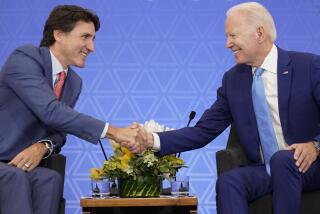Canada Accord Signed for Eskimo Territory in Arctic
- Share via
TORONTO — Federal, territorial and Eskimo leaders signed an agreement Friday to divide Canada’s Northwest Territories and create a native-run land called Nunavut in the eastern Arctic.
The agreement calls for the formal establishment of Canada’s third territory by April, 1999, with a Nunavut government gradually assuming greater powers and responsibility.
The accord cannot be implemented until the Arctic Eskimos, who call themselves Inuit, ratify a $912-million land claim agreement with Ottawa in a referendum to be held Tuesday and Wednesday. Results are not expected until Nov. 12.
If the Inuit approve the land deal, the Canadian Parliament is expected to vote on legislation to establish Nunavut early next year. Nunavut means “Our Land” in Inuktitut, the Inuit language.
“This accord is an historic document that will ultimately change the map of northern Canada, in accordance with the wishes of its residents,” said Tom Siddon, the federal minister for northern development, during the signing ceremony. “It’s a kind of coming of age of the people of this territory.”
The document was signed in Iqaluit, Northwest Territories, by Siddon; Stephen Kakfwi, Northwest Territories minister of inter-government and aboriginal affairs, and James Eetoolook, acting president of the Tungavik Federation of Nunavut, an Eskimo group.
The 770,000-square-mile territory, covering about one-fifth of Canada, is a vast, treeless tundra and a collection of barren, rocky islands that extend to within 550 miles of the North Pole. It is about three times the size of Texas.
Inuit have inhabited the area for more than 4,000 years.
The 17,500 Inuit in the territory represent about 80% of its population. The agreement guarantees equal rights for non-Inuits.
“Instead of having a kind of absentee authority there in Ottawa presiding over this vast domain you will have a much more sensitive and more effective kind of government,” Siddon said in a telephone interview.
John Amagoalik, a negotiator for the Tungavik Federation of Nunavut, said he does not expect overnight changes in the way the region is run.
But he added that “people in this part of the country will for the first time be able to take part in decisions that involve the everyday part of their lives.”
The accord provides for a lengthy period of transition to self-rule, and Ottawa has made commitments to train local people to set up the new territorial government.
The land claim agreement, signed last year, would give the Inuit $912 million over 14 years, and outright ownership of a 136,000-square-mile area. It also gives them the right to hunt, fish and trap in Nunavut.
More to Read
Sign up for Essential California
The most important California stories and recommendations in your inbox every morning.
You may occasionally receive promotional content from the Los Angeles Times.













